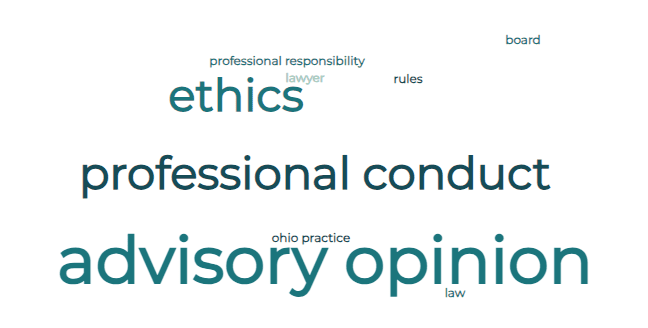June Release – Ohio Advisory Opinions (the more you know)

Two (2) Advisory Opinions that may matter to your practice.
The Ohio Board of Professional Conduct issues advisory opinions, after accepting a solicitation(s) for an opinion. The Opinions issued by the Board are nonbinding in response to a prospective or hypothetical question. The Opinions released are that of the Board and not of the Ohio Supreme Court who has exclusive jurisdiction over the practice of law in the State of Ohio.
The Board released four (4) opinions in June. The following two (2) are those we believe most relevant to the everyday practitioner.
1.Compliance with Subpoena Duces Tecum for Former Client’s File
During the attorney client relationship, we accumulate documents, evidence, memorandum, research, etc, all of which comprise the “Client Fileâ€. Questions arise regarding what is the client file, who can I provide it to, and can I charge for it. Here we will go over a few of the scenarios.
What is the client file?
- Client file includes; documents provided to the lawyer by the client, written and electronic correspondence, pleadings, deposition transcripts, exhibits, physical evidence, expert reports, and other items necessary to the client’s representation.
- Does not necessarily include; lawyer’s notes and internal office memoranda (but may need to be turned over if necessary to a client’s representation). See Ohio Advisory Opinion 2010-2
If representation terminates and/or client requests file, what are my obligations?
- Pursuant to Ohio Rule of Professional Conduct 1.16(d), a lawyer, after termination of the representation is to “promptly†deliver to the client all papers and property (client file) to which the client is entitled.
How long should I retain a client file?
- Absent a file retention policy, the lawyer/lawfirm should maintain the client file for seven (7) years. It is recommended that the lawyer/lawfirm create a file retention policy and procedures to allow for the delivery of a client file. See Ohio Advisory Opinion 2019-06. No matter the retention policy always, always scan and store the file digitally for at least one (1) year.
- Our office policy is that we maintain the hard copy original file for 14 days after the termination of the representation. The client is to instruct us as to their desire of having the original file provided to them within that timeframe. The original file is then electronically scanned and stored digitally indefinitely.
Can I charge to prepare?
- A lawyer is prohibited from charging a client for the copying costs of a paper file. If the matter is stored digitally and the client requests paper hard copies, the lawyer/law firm may pass along the cost so long as such agreement is included in the client fee agreement. See Ohio Advisory Opinion 2019-06.
If requested by subsequent counsel, what are my obligations?
- As long as the client consents, turn over the file.
If requested by Subpoena Duces Tecum, what are my obligations?
- First, assess whether the client provides his/her consent to transmit or release the requested documents, after advising them of the scope of Prof.Cond.R 1.6, the attorney-client privilege, the work product doctrine and any other protections and/or immunities. If the client consents, the lawyer should still seek appropriate protective orders, requesting an in-camera review or other arrangements to limit access to the client’s file and materials.
- If the client does not provide consent or cannot be timely lovated, then the lawyer is obligated to assert all reasonable claims to limit the disclosure of client information. This means the lawyer may have to serve written objections, file a motion to quash and/or appeal an adverse ruling (based upon clients decision)
Am I to be compensated for my time responding to Subpoena Duces Tecum?
- Based upon Advisory Opinion 2023-4, at the time of receipt of the Subpoena and discussion with the client, a lawyer shall discuss the scope and terms of the engagement, any fee to be paid, etc.
- Best practice – include a provision in the fee agreement “In the event that representation has been terminated, and counsel for client receives a subpoena for materials contained in the client file, protected under Prof.Cond R. 1.6 or other protections, the client hereby agrees to compensate for the time and expense incurred by the lawyer/law firm at the rates previously described hereinâ€.
2. Appearance of a Lawyer Affiliated with the Law Firm of a Judge’s Spouse
This opinion evaluates “Whether a judge should recuse himself/herself in a proceeding in which a lawyer appearing in the proceedings is either employed by, associated with, or in a partnership with a judge’s spouseâ€.
The Board analyzes the Code of Judicial Conduct and opines that based solely on the relationship, a Judge need not be immediately disqualified. The analysis hinges on whether a Judge’s impartiality may be reasonably questioned or whether the interest in the matter may be substantially affected by the outcome. The relationship should be disclosed to all parties.
Should you have any questions regarding this post, the Ohio Rules of Professional Conduct, or ethics involving licensed professionals, please do not hesitate to reach out to our firm.
